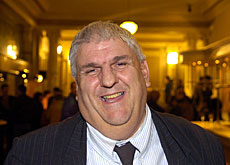
Lausanne’s Jolly Green Giant waits

Switzerland's Green Party has been encountering spectacular electoral success recently, enough to suggest that one of its members should join the cabinet.
But the man many say could be a federal cabinet minister, Lausanne’s popular mayor Daniel Brélaz, tells swissinfo that there is little chance that this script will be played out soon.
The Green Party has been on a high for over a year in Switzerland. At local and cantonal elections, its members have earned themselves a place on town councils and in governments.
One man exemplifies this success – Daniel Brélaz. He was easily re-elected to the Lausanne council in March showing that the Greens are not only popular among the Left or ecologically-minded voters.
For many, this means that the Greens have the right to claim their first-ever cabinet seat in the federal government.
But Brélaz, who is 1.90m tall and tips the scales at more than 150kg, says there is no reason to rush.
swissinfo: The media call you a colossus, a giant, someone unbeatable. How do you handle all these eulogies?
Daniel Brélaz: Thankfully I’m still alive. Usually eulogies are for people who are dead. But it’s clear that my physique makes me an easy person to describe and easy to recognise.
It certainly helps make me likeable, even if some humorists ask me if I’m going to die soon or if I can still climb the stairs at the mayor’s office.
I would say that about 90 per cent of the people [in Lausanne] who can vote know me. You can call it recognition, if not esteem. But I suppose there must be some esteem since I was re-elected.
swissinfo: After 30 years in politics, have you changed?
D.B.: I don’t think so. As time went by, I have learnt to take a harder look at issues. I also have more experience and self-confidence. But I reckon politics has not made me more arrogant. Fundamentally, I haven’t changed.
swissinfo: Has your vision of ecology remained the same?
D.B.: Back in the 1980s, when I was in the House of Representatives, and going to meetings of the European Greens, the Germans were already calling me super pragmatic. But when you have to manage a situation, you find out that reality is not always simple and you have to deal with that.
I’m always ready to work with anyone – be it unions, non-governmental organisations or business leaders – if I feel it is to everyone’s advantage. But I was elected because of the policies I defend and I won’t budge from them.
swissinfo: Why are the Greens making bigger electoral gains in Switzerland now than elsewhere in Europe?
D.B.: It’s our turn now. The Greens in Germany and Belgium also went through periods of strong growth, but they suffered from the participation in government, particularly the Belgians.
In France and Germany, the majority system for elections tends to stifle change. In Italy, the Greens only rate two to three per cent at election time.
In Switzerland, we have two advantages, our system of direct democracy, which allows us to launch nationwide votes, and the proportional voting system.
The Swiss government lacks credibility at the moment and we are fortunate enough to not be a part of it. Where we are part of local councils and cantonal governments, our members have played ball. We have been able to introduce the notion of sustainable development in environmental, social and economic policies.
All these factors mean that voters see the Greens as a third way where social benefits are protected but other reforms are possible.
swissinfo: Do you see the Greens moving from 7.6 per cent of the vote to 14 at the federal elections next year?
D.B.: I don’t think so. The result will probably be between nine and 11 per cent.
We have made inroads in French-speaking Switzerland, but our progress is less spectacular in the German-speaking part of the country.
swissinfo: Even so, you could demand a seat in cabinet…
D.B.: It’s a hypothetical question. The Green leadership is not particularly enthusiastic about the idea. Taking a seat in cabinet means deciding who you want to work with and with what goals in mind.
If it’s to join a seven-member government with a strong extremist element, as it is with the [rightwing] Swiss People’s Party member Christoph Blocher, we’re not interested.
On the other hand, if we could work out an alliance with the [centre-left] Social Democrats and perhaps the [centre-right] Christian Democrats and agree on fundamental issues, it would be a different ballgame. But it’s still a long way off. We would still need ten per cent of the national vote.
swissinfo: What would the political programme of such an alliance have to be?
D.B.. There are probably ten or 12 points that would have to be agreed. These include a tax on greenhouse gas emissions, promoting alternative energy sources, inciting people to save energy, proper equality between men and women, more support for biological farming, extra backing for small and medium-sized companies or more resources for social benefits.
swissinfo: Every time someone mentions a Green minister, your name always crops up…
D.B.: I’ve always said I would be prepared to accept my election to the government, so long as the criteria I’ve outlined are fulfilled.
But given the current political situation, I don’t think there’s much chance of that and I will finish my political career here in Lausanne.
swissinfo-interview: Claudinê Gonçalves
The Swiss Green movement was created in canton Neuchâtel during the 1970s in reaction to a motorway project.
Since then, the Greens have sought and gained political representation at all levels except the federal cabinet and the Senate.
They gained a seat in a local parliament in Neuchâtel in 1972, in a city council (Lausanne) in 1977, in the House of Representatives in 1979 and in a cantonal government (Bern) in 1986.
At the last federal elections in 2003, the Greens garnered 7.4 per cent of the vote and have 13 representatives in parliament. They are the biggest non-governmental party.
Daniel Brélaz was born in Lausanne in 1950.
He has a maths degree from the city’s Federal Institute of Technology.
He spent time in canton Vaud’s parliament between 1978 and 1979, and 1982 and 1983.
He was the first Green to be a member (1979-1989) of a national parliament anywhere in the world.
He joined the Lausanne city council in 1989 and became mayor in 2001.

In compliance with the JTI standards
More: SWI swissinfo.ch certified by the Journalism Trust Initiative






























You can find an overview of ongoing debates with our journalists here . Please join us!
If you want to start a conversation about a topic raised in this article or want to report factual errors, email us at english@swissinfo.ch.